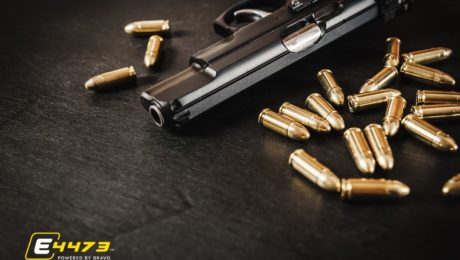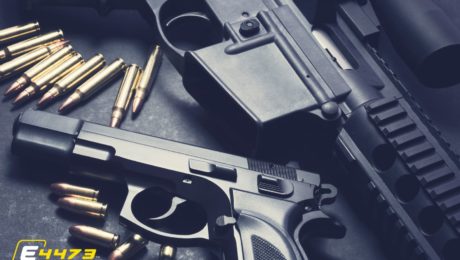For Federal Firearms Licensees (FFLs) across the nation, staying compliant with ATF regulations is paramount. One of the most critical aspects of this compliance is the accurate and efficient completion of the Bureau of Alcohol, Tobacco, Firearms and Explosives (ATF) Form 4473 – Firearms Transaction Record. Traditionally, this has meant mountains of paper, potential errors, and hours spent on manual data entry. But what if there was a better way? What if you could streamline your Form 4473 process, reduce errors, and save valuable time and resources? The answer is here, and it’s called E4473 – your ultimate solution for completing the 4473 forms online. Proudly part of the Bravo Store Systems family, E4473 integrates seamlessly with the comprehensive solutions you trust. The Pain Points of the Traditional Paper 4473: Let’s be honest, dealing with paper forms can be a headache: Human Error: Illegible handwriting, missed fields, and simple data entry mistakes can lead to compliance issues and potential penalties. Time Consuming: Manually filling out each form takes time – time that your staff could be spending on serving customers and growing your business. Storage Challenges: Keeping years’ worth of paper, 4473 forms organized and accessible, can quickly become a logistical nightmare, taking up valuable storage space. Audit Concerns: During an ATF audit, sifting through stacks of paper to locate specific forms can be stressful and inefficient. Enter E4473.com: The Modern Solution for FFL Compliance E4473 revolutionizes the Form 4473 process by offering a secure, efficient, and user-friendly online platform. Here’s why it’s the ultimate solution for your FFL: Error Reduction: Intelligent form fields and built-in validation help ensure accuracy and reduce the likelihood of errors before submission. Time Savings: Customers can securely complete their portion of the form online before even stepping into your store, significantly speeding up the in-store process. Enhanced Compliance: E4473 is designed with ATF regulations in mind, helping you stay compliant and minimize the risk of violations. Improved Customer Experience: Offer your customers a convenient and modern experience, reducing wait times and streamlining the firearm purchasing process. Accessibility: Access your records securely from any device with an internet connection, providing flexibility and convenience for your business. Why Choose E4473? As a firearms dealer, you understand the importance of efficiency and compliance. E4473 offers a significant upgrade to your current Form 4473 process, allowing you to: Serve more customers efficiently: Reduce transaction times and increase throughput in your store. Minimize compliance risks: Reduce errors and simplify record keeping for smoother ATF audits. Embrace modern technology: Position your business as forward-thinking and customer-focused. Save valuable time and resources: Free up staff to focus on other critical aspects of your business. Ready to Ditch the Paper Trail? Stop struggling with outdated paper forms. Embrace the future of FFL compliance with E4473. It’s the smart, secure, and efficient way to handle your online 4473 requirements. Visit E4473.com today to learn more and request a demo. Streamline your operations and experience the ultimate solution for online 4473 processing and elevate your entire FFL operation with the power of Bravo Store Systems! Don’t let paperwork slow you down. Upgrade to Bravo Store Systems and experience the difference. Your business will thank you!
For Federal Firearms Licensees (FFLs) – the backbone of legal firearm commerce – navigating the intricate web of regulations is a daily reality. At the core of every firearm transaction lies a document of paramount importance: the ATF Form 4473, or Firearms Transaction Record. This seemingly simple form is, in fact, the linchpin for ensuring legal compliance and preventing firearms from falling into prohibited hands. But what exactly is the ATF Form 4473, and how do FFL owners meticulously use it to facilitate responsible firearm transfers? What is the ATF Form 4473 (and its eForm equivalent)? The ATF Form 4473 is a federal document mandated by the Bureau of Alcohol, Tobacco, Firearms and Explosives (ATF) for all over-the-counter sales or transfers of firearms by an FFL to an unlicensed individual. Its fundamental purpose is twofold: To gather crucial information from the prospective firearm transferee (the buyer) to determine their eligibility to possess a firearm under federal and state law. To create a legal record of the firearm’s transfer from the FFL’s inventory to the buyer. In recent years, the ATF has embraced technology, allowing for an eForm 4473 – an electronic version of this essential document. This digital shift aims to reduce common errors, enhance efficiency, and simplify record-keeping for FFLs. The FFL’s Crucial Role in the 4473 Process An FFL’s responsibility goes far beyond simply handing a form to a customer. They are the frontline guardians of compliance, meticulously guiding each transaction through several critical steps: Initiation by the Buyer (Section A): The process begins with the prospective buyer completing Section A of the Form 4473. This involves providing personal identifying information (name, address, date of birth, etc.) and answering a series of “yes/no” questions related to their eligibility to purchase and possess a firearm (e.g., felony convictions, domestic violence restraining orders, unlawful drug use). Crucially, the FFL cannot fill out these answers for the buyer or coach them on how to answer. They can, however, direct the customer to the instructions provided on the form itself if questions arise. FFL’s Review and Verification (Section B): Once the buyer completes their section, the FFL takes over. They must carefully review the buyer’s responses for completeness and consistency. This includes: Verifying Identity: The FFL must examine a valid government-issued photo identification (like a driver’s license) to confirm the buyer’s identity and residency information matches what’s on the form. Ensuring Accuracy: The FFL verifies that all required fields are filled out and that there are no obvious discrepancies. The NICS Background Check (Section C): This is a pivotal step. The FFL uses the information from the 4473 to initiate a background check through the National Instant Criminal Background Check System (NICS), maintained by the FBI, or a state Point of Contact (POC) system, depending on their state’s requirements. The FFL records the NICS transaction number, the date/time of the check, and the response (Proceed, Deny, or Delay). Disposition of the Firearm (Section D): If the background check results in a “Proceed,” and all other legal requirements are met (like waiting periods), the FFL then completes Section D of the form, documenting the firearm’s make, model, serial number, and other identifying details. The firearm is then legally transferred to the buyer. Record Keeping: The completed Form 4473, signed by both the buyer and the FFL, becomes a critical permanent record. FFLs are required to store these forms for 20 years from the date of the firearm’s disposition, either in paper format or, if they have an approved variance, electronically. These records must be readily accessible for ATF inspections. Common Challenges for FFLs with Form 4473s Despite its critical role, managing Form 4473s can present numerous challenges for FFLs: Human Error: Illegible handwriting, missed questions, or incorrect entries are common, even for diligent staff and customers. These errors can lead to compliance violations during an audit. Compliance Complexity: The rules surrounding 4473s can be intricate, with specific requirements for different scenarios (e.g., multiple sales, delayed responses, out-of-state residents) and constant updates to federal and state laws. Time Consumption: Manually processing forms, waiting for NICS responses, and physically organizing paper records can be incredibly time-consuming, pulling staff away from sales. Storage and Retrieval: Storing decades of paper forms requires significant physical space and makes quickly retrieving specific records for an ATF trace request or audit a daunting task. Audit Preparedness: Ensuring every form is perfect and easily retrievable for an unannounced ATF inspection is a constant pressure. E4473.com: The Easy Solution for Modern FFLs Navigating these challenges can be daunting, but a modern solution simplifies the entire process. E4473.com, a proud part of the Bravo Store Systems family, is designed specifically to make ATF Form 4473 compliance easy, efficient, and virtually error-free for FFL owners. E4473.com offers an integrated, intuitive platform that transforms the 4473 process: Seamless Integration with Bravo Store Systems: As a core component of Bravo Store Systems, E4473.com connects directly with your POS, inventory, and digital A&D Bound Book. This eliminates duplicate data entry, reduces manual errors, and provides a unified view of your entire business. Intelligent Error Prevention: The electronic form guides customers with clear instructions and built-in validation checks, preventing common mistakes before they occur. This means fewer rejected transactions and significantly less risk of compliance issues. Enhanced Efficiency: Customers can complete their portion of the 4473 on a tablet or their own mobile device, greatly speeding up the in-store experience. The digital process expedites NICS checks and form finalization. Always Compliant: E4473.com is continuously updated to reflect the latest ATF regulations and form revisions, ensuring your operations remain compliant without constant manual oversight. Improved Customer Experience: A modern, streamlined, and paperless transaction process enhances customer satisfaction and reflects positively on your business. For FFL owners, mastering the ATF Form 4473 is non-negotiable. With the complexities involved, leveraging cutting-edge technology isn’t just a convenience; it’s a strategic imperative. E4473.com, backed by the comprehensive power of Bravo Store Systems, provides the easy-to-use, robust solution needed to ensure compliance, boost
A Comprehensive Guide to FFL Gun Fees: A B2B Perspective Understanding FFL Gun Fees: A Crucial Aspect of Firearms Business As a business operating in the firearms industry, understanding FFL (Federal Firearms License) gun fees is paramount. These fees can significantly impact your bottom line, especially if you’re dealing with high-volume transactions. In this comprehensive guide, we’ll delve into the intricacies of FFL gun fees, exploring various factors that influence them and providing practical tips to manage your costs effectively. What are FFL Gun Fees? FFL gun fees are charges imposed on licensed firearms dealers for the services they provide. These fees typically cover the administrative costs associated with processing firearm transfers, maintaining compliance with federal regulations, and ensuring the safety and security of firearms. Factors Influencing FFL Gun Fees Several factors can influence the specific FFL gun fees you’ll encounter: Type of FFL: The type of FFL you hold will determine the fees you’re subject to. For instance, a Type 01 dealer (retailer) might face different fees compared to a Type 07 (manufacturer). Federal Regulations: Changes in federal firearms regulations can impact FFL fees. For example, new compliance requirements might lead to increased administrative burdens, which could result in higher fees. State and Local Laws: In addition to federal regulations, state and local laws can also influence FFL gun fees. Some jurisdictions may impose additional fees or restrictions on firearms dealers. Volume of Transfers: The number of firearm transfers you handle will generally affect your overall fees. Dealers with higher volumes may be able to negotiate better rates or discounts. Transfer Type: The type of transfer (e.g., retail sale, private party transfer, consignment) can also influence fees. Some transfers might involve more complex paperwork or administrative procedures, leading to higher costs. FFL Provider: Different FFL providers may charge varying fees for their services. It’s essential to compare rates and services to find the most cost-effective option. Common FFL Gun Fee Components While the specific breakdown of FFL gun fees can vary, the following components are often included: Transfer Fees: Charges for processing firearm transfers, including background checks, paperwork, and administrative costs. ATF Fees: Fees imposed by the Bureau of Alcohol, Tobacco, Firearms, and Explosives (ATF) for licensing and compliance purposes. NFA Fees: Fees associated with National Firearms Act (NFA) items, such as suppressors or machine guns. Storage Fees: Charges for storing firearms on behalf of customers. Additional Services: Fees for services beyond the basic transfer process, such as shipping or insurance. Managing FFL Gun Fees: Practical Tips Negotiate Rates: If you have a high volume of transfers, consider negotiating with fellow FFLs for better rates or discounts. Review Fees Regularly: Periodically review your FFL gun fees to ensure they remain competitive and aligned with your business needs. Minimize Administrative Burdens: Streamline your operations to reduce administrative overhead and associated costs. Stay Informed about Regulations: Keep up-to-date with federal, state, and local firearms regulations to avoid penalties and unnecessary expenses. Pass Fees on to Customers: In some cases, you may be able to pass a portion of your FFL gun fees on to your customers. However, it’s important to be transparent about your pricing structure. Understanding FFL gun fees is crucial for any firearms business. By understanding the factors that influence these fees and implementing effective management strategies, you can minimize costs and maximize your profitability. By following the guidelines outlined in this guide, you can make informed decisions regarding your FFL fees and ensure your business remains competitive in the firearms industry.
A Comprehensive Guide to FFL Firearm Meaning: A B2B Perspective Understanding FFL Firearms: A Crucial Aspect of Firearms Business As a business operating in the firearms industry, understanding the concept of FFL firearms is paramount. This term, often used interchangeably with FFL-regulated firearms, encompasses a wide range of weapons subject to federal regulations. In this comprehensive guide, we’ll delve into the intricacies of FFL firearms, exploring their definitions, types, and the significance of FFL licensing in the firearms industry. What are FFL Firearms? FFL firearms are firearms that are regulated by the Bureau of Alcohol, Tobacco, Firearms, and Explosives (ATF) and require a Federal Firearms License (FFL) for their manufacture, importation, or sale. These firearms include a variety of weapons, such as: Handguns: Pistols, revolvers, and other firearms designed to be held with one hand. Rifles: Firearms designed to be fired from the shoulder, typically using longer barrels. Shotguns: Firearms designed to fire multiple projectiles, such as buckshot or birdshot. Destructive Devices: Weapons, such as grenades, machine guns, and silencers, that are capable of causing significant damage. The Significance of FFL Licensing FFL licensing is a crucial aspect of the firearms industry. It ensures that businesses dealing in firearms adhere to federal regulations, preventing the illegal trafficking of weapons and promoting public safety. By obtaining an FFL, businesses can legally engage in the manufacture, importation, and sale of firearms, subject to specific requirements and restrictions. FFL License Types There are several FFL License types available, each with its own specific requirements and limitations. These include: Type 01: Dealer in firearms other than destructive devices. Type 02: Pawnbroker in firearms other than destructive devices. Type 03: Manufacturer of firearms. Type 07: Manufacturer of ammunition. Type 08: Importer of firearms. Type 09: Dealer in destructive devices. Key Regulations for FFL Firearms FFL firearms are subject to various federal regulations, including: Gun Control Act of 1968: This act established the framework for regulating the sale and possession of firearms in the United States. National Firearms Act (NFA): The NFA imposes additional regulations on certain types of firearms, such as machine guns, suppressors, and short-barreled rifles. Anti-Drug Abuse Act of 1988: This act imposed stricter regulations on the sale and possession of firearms, particularly those associated with drug trafficking. Compliance and Recordkeeping FFL holders are required to comply with strict recordkeeping requirements. They must maintain accurate records of all firearms transactions, including sales, purchases, and transfers. Additionally, FFL holders must conduct background checks on all purchasers to ensure they are not prohibited from owning firearms. Understanding the concept of FFL firearms and FFL License types is essential for businesses operating in the firearms industry. By comprehending the different types of FFL firearms, the significance of FFL licensing, and the applicable regulations, you can ensure that your business complies with federal laws and operates ethically. This knowledge will also help you navigate the complexities of the firearms industry and make informed decisions regarding your business operations.
A Safer Way to Sell Firearms
E4473 helps FFLs support safer firearm transactions by guiding customers through a secure digital 4473 process, reducing common errors, and keeping records organized and audit-ready.
Built-in validation, secure data handling, and streamlined workflows help protect your business while delivering a smoother customer experience.
Schedule a demo to see how E4473 works in your store.
![]()





